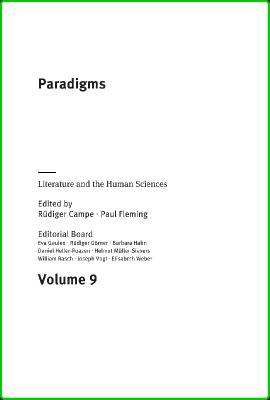Farid
Active member
Arts of Connection Poetry, History, Epochality (Paradigms)

General:
Description:


English | ISBN: 3110630583 | 2019 | 212 pages | PDF | 993 KB
General:
Format: pdf
Size: 992.56 KB
Description:
This new series presents original scholarly and essayistic work addressing the central status of literature in and for the human sciences. At stake in the monographs and essay collections are paradigms of literary forms for thinking the human sciences: the knowledge involved in a literary work; how modes of reading and writing shape and depend on an epoch or area of thinking; literature's affinities and points of resistance to what we call the humanities and the sciences. In other words, the series examines how literature works with and upon philosophy, rhetoric, technology, anthropology, sociology, statistics, economics, history, experimental science, mathematics etc. Paradigms is primarily concerned with German letters, but also includes its European and comparative literary contexts.
All volumes will be published in English and are first reviewed by the series editors followed by a peer review from two academics in the particular area of specialization. Two to four volumes are planned annually.
Editors
Rüdiger Campe (Yale University)
Karen S. Feldman (University of California, Berkeley)
Editorial Board
Paul Fleming (Cornell University)
Eva Geulen (Zentrum für Literatur- und Kulturforschung, Berlin)
Rüdiger Görner (Queen Mary, University of London)
Barbara Hahn (Vanderbilt University)
Daniel Heller-Roazen (Princeton University)
Helmut Müller-Sievers (University of Colorado at Boulder)
William Rasch (Indiana University, Bloomington)
Joseph Vogl (Humboldt University, Berlin)
Elisabeth Weber (University of California, Santa Barbara)
Submission Format
The series accepts monographs and edited volumes, if they systematically approach a specific topic and show a high level of coherence and focus.
Please submit an abstract and table of contents with narrative description of each chapter (4-5 pages total, single-spaced) as well as a CV along with the complete manuscript.
Only complete manuscripts can be evaluated. In exceptional cases, abstracts or outlines can be submitted to discuss the general fit of a book with the series' editors. Please understand that a final commitment for publication can only be reached on the basis of a complete manuscript.
Manuscripts should have a minimum length of circa 200 pages (approximately 500,000 characters including spaces).
Please submit your abstract, table of contents, and CV as one file; the complete manuscript as a second file to Dr. Myrto Aspioti: myrto.aspioti@degruyter.com.
At the intersection of literary theory, philosophy of history and phenomenology, Arts of Connection: Poetry, History, Epochality explores the representation of connections between events in literary, historical and philosophical narratives. Events in a story can be seen as ordered according to proximate causation, which leads diachronically from one event to the next; and they can also be understood in view of the structure of the narrative as a whole - for instance in terms of the unity of plot. Feldman argues that there exists an essential narrative tension between these two kinds of connection, i.e. between the overarching arrangement or plot that holds together events from "outside," as it were, in order to produce an intelligible whole; and the portrayal of one-by-one, "interstitial" connections between events within the narrative. Arts of Connection demonstrates, by means of exemplary moments in Aristotle and classical German poetics, eighteenth-century philosophy of history, and twentieth-century phenomenology, that the task of connection is a fraught one, insofar as the formal unity of narrative competes or interferes with the representation of one-by-one connections between events, and vice versa.
Read more

Code:
https://rapidgator.net/file/34da92ec78ccb499610d9e7c02092aa4/Arts_of_Connection_Poetry_History_Epochality_Paradigms.rar
Code:
https://nitro.download/view/ADAA783B0F2DD36/Arts_of_Connection_Poetry_History_Epochality_Paradigms.rar